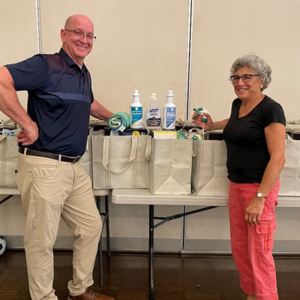Support and Resources for Eastern Pennsylvanians
Read on to learn more about best practices regarding the use of pesticides, lead exposure, indoor and outdoor air quality, and other environmental health exposures.
Pesticides
Early learning center personnel and individuals should avoid the use of pesticides whenever possible due to environmental health exposures.
For more information on preventing health impacts related to pesticides, see the U.S. Department of Agriculture’s Washing Fruits and Vegetables fact sheet with advice on how to clean food to keep yourself and young children safe.
Preventing Exposure to Lead in Philadelphia
For information on self-remediation for lead, visit the EPA’s website on its lead renovation and repair program.
Often, lead dust requires professional handling and remediation to avoid harmful exposure. Luckily, the City of Philadelphia has a resource to help connect you with certified lead abatement contractors.
View a list of Contractors certified in the City of Philadelphia.
For information on lead testing and remediation in drinking water, visit PA Dept. of Environmental Protection Lead Testing website.
Disposing of Mercury thermometers, blood pressure cuffs, old batteries, etc.
Infants in the womb can be exposed to methylmercury when their mothers eat fish and shellfish that contain methylmercury. This exposure can adversely affect unborn infants’ growing brains and nervous systems. These systems may be more vulnerable to methylmercury than the brains and nervous systems of adults.
Children exposed to methylmercury while they are in the womb can have impacts on their cognitive thinking, memory, attention, language, fine motor skills, and visual-spatial skills.
Visit here to drop off locations for Mercury, a hazardous material, in Philadelphia.
Indoor/Outdoor Air Quality
WHE recommends a variety of steps to take to ensure proper indoor and outdoor air quality in homes, schools, and early learning centers. See below to access free resources for educational materials, hand-outs, and even free signs to ensure your commitment to healthy environments is clear.
Additional Resources
Preventing Exposure to Toxins
WHE recommends taking steps to prevent the release of toxins in schools and early learning facilities. See below for articles and other resources that inform our recommendations.
Heating plastic in the microwave releases toxins into foods – WHE recommends only microwaving glass takeout containers.
View WHE’s fact sheet on radon in the learning environment.
Healthy Cleaning for Childcare
WHE recommends schools and centers purchase more hydrogen peroxide, isopropyl alcohol, and white vinegar-based products to ensure little to no impact to student and faculty’s health in the built environment. To learn more:
The Environmental Protection Agency provides an eco-healthy disinfecting toolkit, which can be accessed here
Safe Siting of Childcare in Pennsylvania
Choose Safe Places for Early Care and Education (CSPECE) is a program that helps ensure childcare centers are located in safe places, so that children are not exposed to harmful chemicals from the surrounding environment for childcare in Pennsylvania. To learn more about the program, visit the PA Department of Health’s website here.
